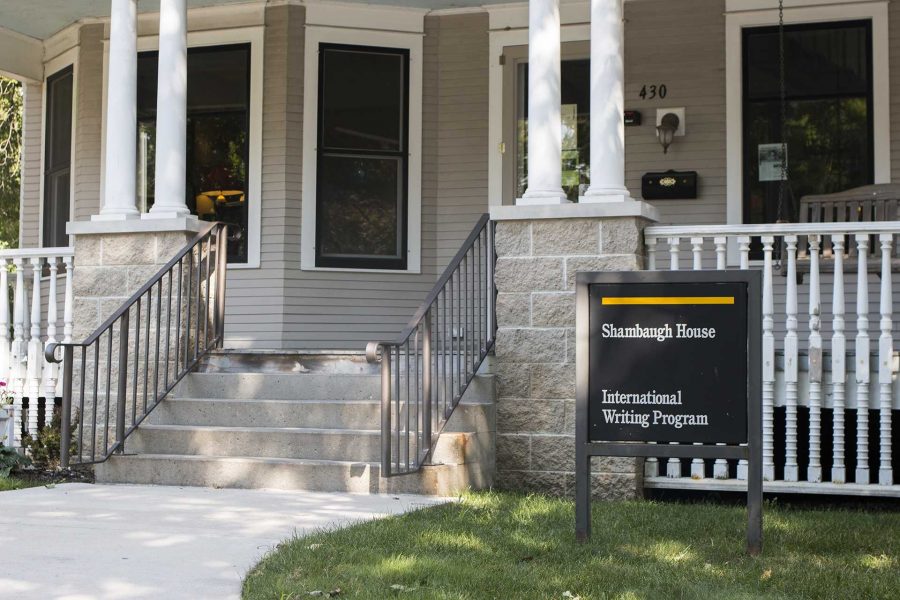An Iraqi poet and International Writing Program resident breaks through silence and writes her way to Iowa City and environs.
By Joshua Balicki
As the oldest and largest multinational writing residency in the world, the International Writing Program will celebrate its 50th anniversary this year.
Over the 12 weeks of residency, established writers from around the world live in Iowa City to workshop, collaborate, travel, and inspire others.
This year, the 35 IWP residents represent 34 different countries. A part of the residency is the Shambaugh House Reading Series. Lava Omer Darwesh, a poet and translator from Iraq, will read at the Shambaugh House at 5:30 p.m. Friday, along with Fatena Alghorra.
RELATED: The other side of Palestine
In her first three weeks of residency, Darwesh has cherished her experiences.
“It has been a wonderful journey,” Darwesh said. “I have had a chance to meet writers from different parts of the world I have not heard about before. We are trying to exchange ideas. I think by the end of the residency, we will all have influenced each other at some level.”
Darwesh has a history in the Iowa City literary community.
“One of my poems was published around two years ago in the Iowa Review,” she said. “The same poem was chosen to be a part of a writing project called Lanterns of Hope, which was [established for] Iraqi youth writers.”
The U.S. Embassy asked for more of her poems and later nominated her for the IWP residency.
“Once I searched online, I learned that it [IWP] was huge,” Darwesh said. “There are so many writers with experiences, and publications, and talents.”
She believes she is at the beginning of her literary career with much work left to accomplish. She has not defined her style as a poet, either, continually experimenting with free verse, rhyme, meter, and perspective.
“For my poetry, I mostly try to cover stories and describe them in a different perspectives to give them different meanings,” Darwesh said. “My poems deal with a lot of voices.”
She uses poetry to reach people from different cultures. Her own voice as a writer is developed with “time and experience.”
She is most influenced by literature, and it is a huge part of her life, she said.
“For me, I have always loved to read,” Darwesh said. “I have been influenced by poets such as Sylvia Plath and Elizabeth Bishop and novelists such as George Orwell and Mary Shelley.”
She has also played a pivotal part in Iraqi translation.
“I am coming from a culture that the first language is Kurdish, then Arabic, and then the third language is English,” Darwesh said. “We [Iraqis] do not have many works that have been translated into Kurdish.”
With her education at American University of Iraq, Darwesh writes primarily in English, which has opened many doors for her as a translator and poet. This has helped local Iraqis have access to accurate and diverse translations.
As a student at the university, Darwesh established a Book Lovers’ Club last fall. It is a space for students to share, discuss, and translate their favorite books, and it is also used as an avenue to publish their work.
“We wanted to create a space for people who love to read,” she said.
Furthermore, Darwesh, with the help of her friend, established the Freedom Writers’ Club in February. The club started as a creative-writing workshop once a week at American University of Iraq.
“We had professors who read their work and gave advice,” Darwesh said. “We were doing our own writing and sharing it.”
She appreciates the rich literary history found in Iowa City.
“I always wanted to visit Iowa because I heard that in Iowa, you can call yourself a writer or a poet and not be laughed at,” she said. “That is something controversial in my country.”
Darwesh’s advice for writers is simple: Never give up.
“If you know you have this voice inside, and you have stories that you really want to tell, then you should never be silenced,” she said. “Some people in my country do not have the same opportunities that I have … I am trying to be the voice for them.”



